Make a change today!
"Real Time" Magazine is an online, self-funded news magazine, founded with a firm idealogy to make a different, alternative, uncensored quality news, accessible and direct to and with the public.
Our team members currently work as volunteers and we would DEEPLY appreciate and love your support, so we can keep provide what is direly missing in mainstream media.
click for single / monthly support
Thank you ??

"We can’t locate a signed agreement with Pfizer": Did the Netanyahu government and the Israeli MoH mislead the Israeli public and the world? New documents reveal – the deal between Israel and Pfizer was signed before their vaccine even received EUA
"We can’t locate a signed agreement with Pfizer", The Israeli MoH stated in a court hearing two weeks ago. However, last week the ministry suddenly announced that the missing document was found. But this story is only the prelude to the real drama: the new documents reveal that the ministry actively attempted to conceal the fact that the deal with Pfizer, including the agreement for a trial on Israeli citizens, was signed before the vaccine received the emergency permit from the FDA, and created a false representation according to which it was signed later


Summary
- Two weeks ago, the Israeli MoH stated before the court that it was unable to locate the agreement signed with Pfizer regarding the sharing of epidemiological information on COVID-19 vaccines
- The claim was made in response to a court petition after the MoH failed to respond to a request made by the "Alertness for Human Rights Association" under the Freedom of Information Act. The Association was attempting to establish the authenticity of the "Pfizer agreement" published in January 2021, and whether or not it was signed by MoH CEO Hezi Levy and Pfizer's representative whose name had been redacted. The document also had significant portions, including dates and page numbers, redacted.
- About a week ago, the ministry unexpectedly announced that they had located the missing document. The announcement came less than a day after the story was reported on the 'Kan 11' channel, which had contacted the MoH for a response.
- The new document and the MOH's response contain dramatic information: contrary to what was indicated by the unsigned copy, it appears that the deal with Pfizer was signed before the vaccine received EUA. However, the MOH actively attempted to conceal this information and even created a false representation that the agreement was signed at a later date.
- It is unclear if the recently-released copy is the authentic document that was signed with Pfizer, or if such a signed document even exists. The current copy presented as signed shows the signature of Prof. Hezi Levy as a representative of Israel, but the identity and signature of the Pfizer representative are redacted, as are the page numbers.
The Netanyahu government and the Israeli Ministry of Health ("MoH") tried to conceal the fact that the deal with Pfizer, including the agreement for a "Real World" epidemiological trial on the Israeli population, was signed before their mRNA COVID-19 vaccine even received emergency use authorization (EUA) from the FDA, , and misled the public by creating a false representation that the "Israel-Pfizer Agreement" was signed after the vaccine received EUA.
This information was revealed in documents obtained through an administrative petition submitted to the Jerusalem District Court on September 7, 2021 by the non-profit organization "Alertness for Human Rights" against the Minister of Health Nitzan Horowitz, the Director General of the Ministry Prof. Nachman Ash, and the person appointed by the Ministry according to the Freedom of Information Law. The petition was filed after the Ministry of Health ignored the organization's Freedom of Information request for six months. It is also unclear if the copy of the "Israel-Pfizer Agreement" that the ministry has now provided to the court is indeed the authentic document signed with Pfizer or if such a signed document even exists.
"The newly-revealed documents raise serious questions and doubts, and in fact, more questions than answers", says attorney Gal Gur. "We now know that the state and the Ministry of Health tried to conceal from the public the fact that the deal with Pfizer was signed before the vaccine even received an emergency permit from the FDA. This raises the question of whether the Netanyahu government and the Ministry of Health misled the Israeli public and the world."
To fully understand the story, and how the Ministry of Health consistently attempted to hide this critical information, it is necessary to follow the sequence of events, step by step.
Episode 1: The State of Israel in a first version to the court – presents a new copy of the agreement – but it is also unsigned
The drama that unfolded during the court hearing two weeks ago is reminiscent of a Kafkaesque story. As it appears from the minutes of the hearing, Adv. Ahava Berman, the attorney representing the MoH, probably cannot believe until now that this is happening to her – from the moment she found herself standing before the court stating over and over again, in writing and orally, that the MoH searched and searched but simply could not locate the authentic 'Real-World Epidemiological Evidence Collaboration Agreement' signed by the State of Israel and Pfizer – up to the moment when she informed the court, a few days later, that the MoH found the signed agreement.
But all this is just the beginning of this incredible story. The affair began on April 30, when Dr. Yosef Zernik from "Alertness for Human Rights Association" submitted to the MoH a Freedom of Information request (Appendix 1 to the petition) containing a number of questions regarding the agreements signed by the State of Israel (the MoH) and Pfizer.
Dr. Zernik asked the ministry to present a scan or image of the final, signed, authentic document of the "Pfizer Agreement" that the MoH published on January 17, 2021. The purpose of the request was to establish the authenticity of the "Pfizer agreement" published in January 2021, and whether or not it was signed by MoH CEO Hezi Levy and Pfizer's representative whose name had been redacted. Their signatures did not appear in the document previously released, and the document had significant portions, including dates and page numbers, redacted. In addition, according to the FOI request, it seems that the document was created in pieces rather than as a single document since in some pages the text is accessible as text, and on some as an image only. "An examination of this document raises concerns regarding its authenticity and validity...", Dr. Zernik wrote in the FOI request. "The general concern is that this is a 'renovated' document". Dr. Zernik also wanted to know how many different agreements were signed with Pfizer during the Covid-19 pandemic, as well as the names of the various contracts signed and the dates when they were signed.
On May 30, 30 days after the FOI request was submitted, Dr. Zernik received a message from the MOH stating that the ministry needs an additional period of 30 days in order to review his request. However, since then he has not heard from them again, not even after two notifications before taking legal action he issued to the MoH on July 22 and August 22.
Finally, after months of being ignored by the MoH, in early September, Dr. Zernik submitted an administrative petition to the Jerusalem District Court. Only then, on October 26, after significantly exceeding the time frame available to respondents for information requests under the FOI Law, did the MoH issue a partial response, including a new copy of the "Israel-Pfizer Agreement", which they claim "existed in the office" (Appendix 1 to this document).
However, it turned out that the new copy was also unsigned by any of the parties; and still, most of the parts that were redacted in the initial copy published on January 2021, remained redacted without concrete explanations, including the date and page numbers. Furthermore, from their partial response, it was not possible to learn anything about the authenticity and legal validity of the document presented to the public as the "Israel-Pfizer Agreement".
Nevertheless, the response revealed critical information: it was suddenly discovered that the "Israel-Pfizer Agreement" was apparently signed at an earlier date than could be understood from the initial document published in January 2021 and that in fact, the transaction between Israel and Pfizer, included at least four official agreements. We will return to this response and its significance later.
Episode 2: Drama in the court – the State of Israel in a second version: we searched and cannot locate a signed agreement with Pfizer
Dr. Zernik did not give up. He continued the legal process, with the aim of getting a full and thorough answer to his question - is the copy presented to the public as the "Israel-Pfizer Agreement" indeed the official copy signed between the State of Israel and Pfizer in the transaction between them, or is it a random computer document that does not have any legal validity in this deal?
On November 21, when Dr. Zernik did not withdraw the petition, the state submitted a "preliminary response", in which the unimaginable statement was raised for the first time: "Following the claims of the petitioner, another investigation was conducted, and no signed copy of the agreement was found. Therefore, all that remains is to reject the petitioner's request to receive the signed agreement in accordance with Section 8(3) of the Freedom of Information Law".
In other words, the MoH claimed: we searched and couldn't locate the signed agreement – therefore the petition must be rejected.
About two weeks ago, on December 1, the hearing on the petition took place. It's hard to believe, but two years after the rollout of the vaccination campaign began – at the heart of the discussion, as Judge Yoram Noam has put it – was the question of whether the State of Israel had even signed such an agreement with Pfizer and the MoH was simply unable to locate it, or whether such an agreement was actually never signed?
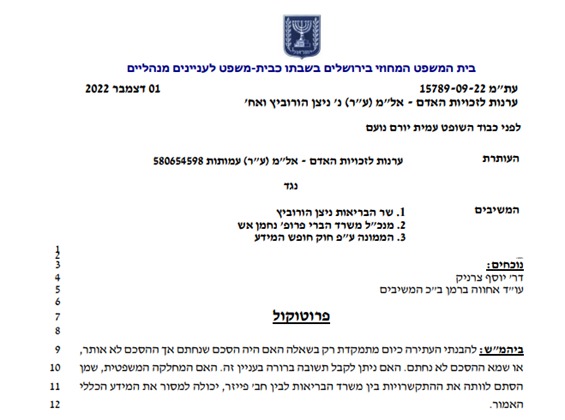
As the minutes of the discussion show, the MoH continually stated that it could not find the signed agreement.
"We searched and could not find a signed agreement."
"We tried to locate the signed agreement. It was not found."
"We tried to look for a signed agreement. We did not find a signed agreement... We searched in all the relevant places, including the CEO's office and the legal office. We were looking in the place where the agreements are supposed to be in".
This is what Attorney Berman repeatedly claimed during the hearing, and in response to the questions by the judge, Yoram Noam.

Despite the court's tendency to accept the MoH's position, even the judge could not help but wonder about the puzzling redaction of the page numbers: "I didn't understand why the page numbers were redacted," he said. Nevertheless, he agreed in his decision to exempt the ministry with meager and general requirements – which largely amount to clarifications regarding the very existence of a signed agreement.

Episode 3: A twist in the plot - the State of Israel in a new and third version to the court: We DO HAVE a signed agreement with Pfizer!
On December 8, the state submitted a final response, in which, as expected, it repeated the claim that it was not able to locate a signed agreement with Pfizer and that in fact, it was still not clear whether such an agreement was even signed, even after "a comprehensive inquiry with many officials at the Ministry of Health". The state also stated that a request was made to Pfizer to find out if the company has a signed copy, "but no reply has yet been received", they claimed. The ministry did not address the issue of redacting the page numbers.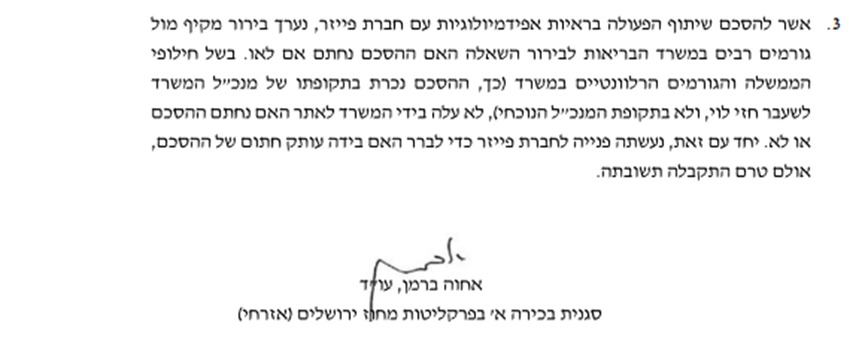
With that, this saga could have ended sadly, but last Wednesday (December 13) there was a surprising turn in the plot when the MoH on its own initiative suddenly announced: the loss has been found! "An epidemiological evidence cooperation agreement with Pfizer was located in the Ministry of Health, signed by the parties to the agreement", according to the MOH's message.
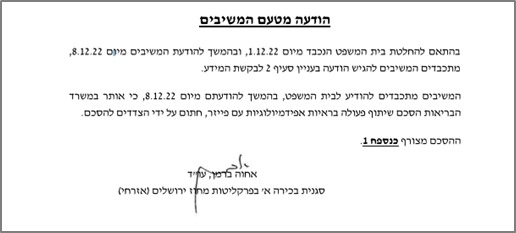
The amazing part of this turn of events is that it occurred less than a day after the 'Kan 11' reporter contacted the MOH requesting a response to an article on the subject, according to Nov Reuveni, the channel's reporter who submitted the request - to whom Dr. Zarnik contacted with the story following the Ministry of Health's response that they did not manage to locate the document.
"This puzzling story raises many questions," says Attorney Gur. "Why did the ministry forcefully and stubbornly state before the court that they do not have a signed document and that it is not even clear at all if such an agreement was signed, and only after many months, and after a request by the media, suddenly presented a copy with Prof. Levy's signature? Did the ministry neglect to keep a signed and verified copy as required for such a huge deal, or did it have such a copy and lied about it, while hiding the information from the court and the public? And if they lied - why? Did Prof. Levy not want his signature to be recorded on this document? And how do we know that they didn't go to find Prof. Levy just now and ask him to sign?".
The new documents reveal: 4 agreements and partial disclosure of redactions - more questions than answers
From this point, the drama is just beginning to unfold, as the documents that the MoH was forced to present following the petition reveal new and dramatic information. Attorney Gur, who examined the new documents, says that the information indicates that there are at least four key agreements/documents that the IMOH signed with Pfizer, and that all four were signed before the vaccine received the EUA from the FDA. Even worse, it appears that an attempt was made to actively conceal the date of the real signing of the deal, and apparently even lying about it and creating a false representation that it was signed later. These are the four agreements that were revealed:
The information sharing agreement with Pfizer – this is the agreement whose redacted and unsigned copy was published by the MoH on January 17, 2021, presented as the "Israel-Pfizer Agreement", or in its formal name "Real-World Epidemiological Evidence Collaboration Agreement".
In fact, this is the agreement that specifies the terms of information sharing between the State of Israel and Pfizer in a "real world" study to be conducted in Israel – on Israeli citizens. The stated purpose of this agreement was to collect and analyze epidemiological data resulting from the vaccination of the Israeli population, and to determine whether herd immunity would be achieved as a result of the vaccine.
Now, following the petition and the appeal of the 'Kan 11' channel, a signed copy of this agreement was purportedly found (Appendix 1 in the MOH's response from December 8, 2022). Also, there is a reference to this agreement in the partial response document to Zernik's FOI request provided by the ministry on October 26 (section 10a).
Perhaps the most significant revelation emerging from these two new documents – the new copy of the agreement and the partial response document – is the date of signing of this agreement. As can be seen in the following screenshot of the initial unsigned copy that was shown to the public, the second line of the document specifies January 6, 2021, as the date the document was signed. The document says:
"This cooperation agreement for real-world evidence is dated January 6, 2021 (hereinafter "the agreement") by and between the Ministry of Health, acting on its own behalf and on behalf of the State of Israel ("MoH"), and Pfizer...".
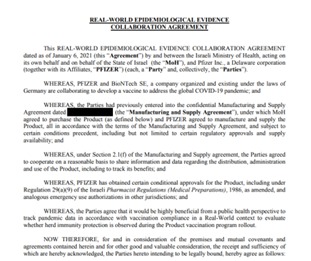
However, in the partial response to the FoI request provided by the Ministry on October 26 (section 10a) after Dr. Zernik petitioned the court, the MOH admits that this agreement was actually signed on December 1, 2020 - about five weeks earlier.
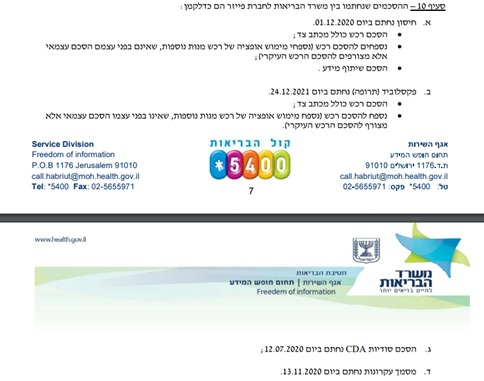
In simple words, the response document reveals that the MOH actively concealed the true date of the signing of the agreement - December 1, 2020, and lied about it while presenting a later date in the document - January 6, 2021. Even worse, since the cooperation agreement was presented to the public as "The Information Sharing Agreement" – presenting the document with the later date created a false representation, from which the public could have concluded that the entire deal with Pfizer was signed later than the actual signing date.
This deception is especially important in light of the fact that the EUA was granted to Pfizer by the FDA only on December 11, 2020. That is, "The Information Sharing Agreement" was signed about ten days before even an emergency permit was received from the FDA for this product, and the MOH tried to hide it and lied about it.
Attorney Gur: "Also, the question arises, how did they already know at the time of the signing of the information sharing agreement on December 1, 2020, to insert into the agreement a date that later and in practice was after the receipt of the EUA? Did they know at the early signing date that this permit would necessarily be granted, and also how soon it would be granted?".
In addition, it is still unclear whether this new copy that has now been presented to the court is a copy of the authentic document of "The Information Sharing Agreement", and whether it has any legal validity since the only signature shown on it is that of Prof. Hezi Levy, who was the Director General of the MOH at the time, as a representative of the MOH and the State of Israel. However, the name and signature of the representative on behalf of Pfizer are still redacted in the new copy as well. Attorney Gur: "What reason - commercial or otherwise - could there be to hide the identity and signature of an executive in a commercial corporation who signed an official agreement with a state?".
"Furthermore, the page numbers in the new copy are also still redacted. And here, as the judge also wondered at the hearing of the petition, one must ask - why? What reason could there be for hiding the page numbers? Surely it cannot be claimed that the page numbers are a 'trade secret'. "There is a concern that the copy of the agreement may not include all of its pages. This is especially concerning due to the presence of redacted sections at the end of some pages and the beginning of others, which raises the possibility that there may be missing pages between them. How can we be sure that there are no missing pages between these redacted sections?".
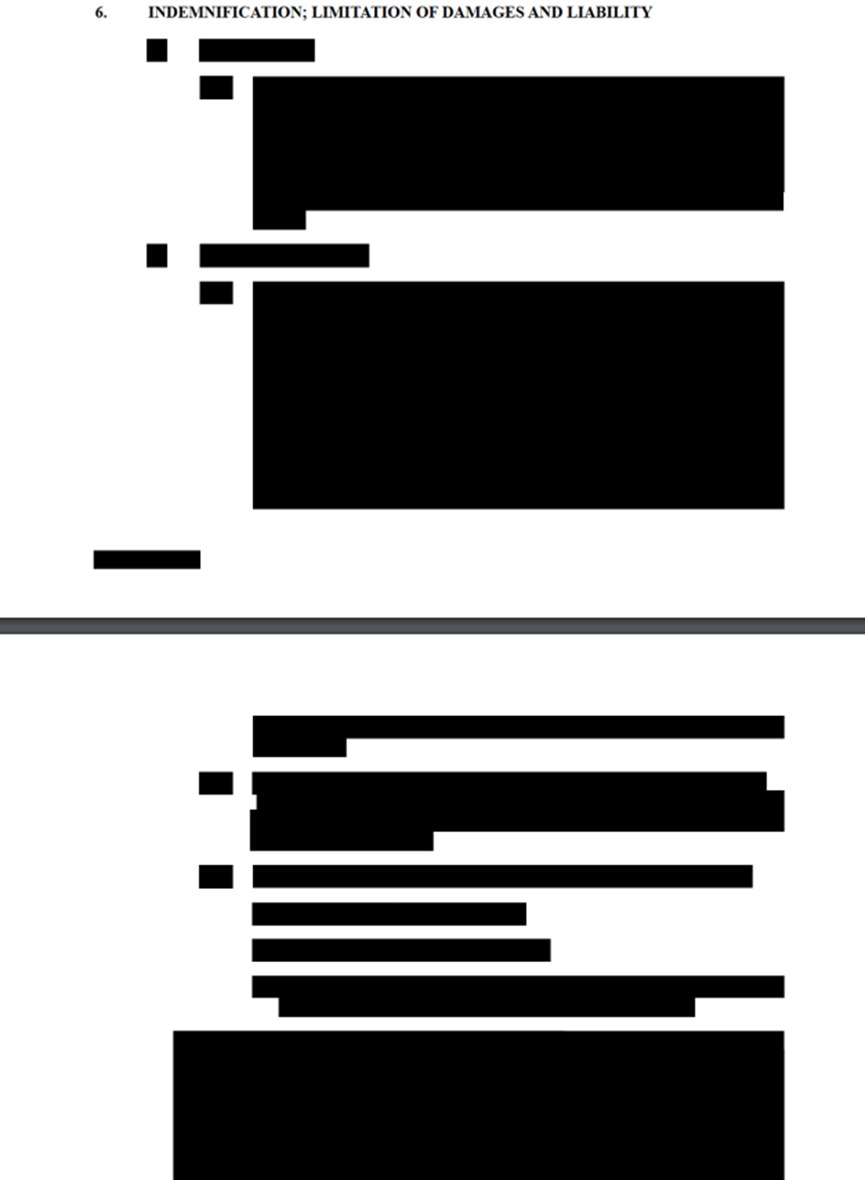
An interesting observation is that while most of the sections redacted in the previous copy remain redacted in the current one, some of them are suddenly revealed. This raises questions about the reasons for the redactions. Attorney Gur: "No explanation or reasoning was given for the decision to black out these lines before, or to reveal them now. What is the reason for this? Did the document previously contain information that was a commercial secret and/or could harm Israel's negotiating abilities and now it doesn't? Is this a mistake, or is this a copy of the agreement received from Pfizer - and should we conclude from this that the reductions in the first published copy were intended to hide this particular information mainly from the public? We have no way of knowing for sure, but maybe further examination of the newly revealed lines can provide insight into the reasons for the original redactions".
The production and supply agreement with Pfizer – This agreement, which is also referred to as the "Manufacturing and Supply Agreement" in "The Information Sharing Agreement", has not been made public. However, its existence has been known since the unsigned copy of "The Information Sharing Agreement" was first published in January 2021, as it is clear that the two agreements are connected to the same transaction. The new disclosure relates to the date of signing the purchase agreement.
Now it becomes clear for the first time that this agreement, i.e. the purchase transaction itself, was signed on December 1, 2020, at the same time as "The Information Sharing Agreement". This is indicated by a line of text on the first page of "The Information Sharing Agreement", which was previously redacted but has now been revealed in the new copy (the date of December 1, 2020, is indicated by the MOH in also mentioned in section 10a of the response document to Dr. Zernik's FOI".
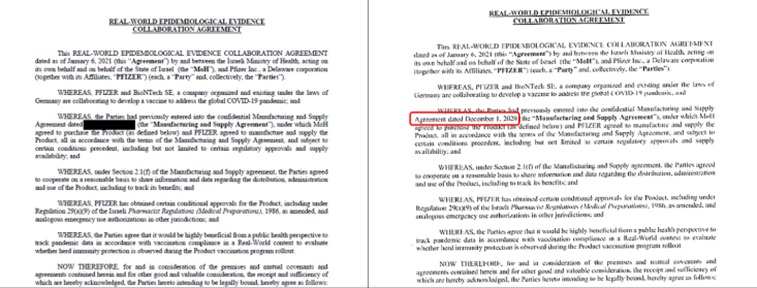
Confidentiality Agreement - from the MOH's response (section 10c) it appears that this agreement was signed by the Ministry of Health and Pfizer on July 12, 2020. In fact, this agreement was signed three months before Pfizer submitted an application, and even before the company began the phase 3 study on its product. Attorney Gur: "It is not clear the existence of this agreement was kept secret from the public until now. While a confidentiality agreement may contain sensitive information that could be redacted, its main purpose is to establish a confidentiality mechanism. Therefore, it is unclear why the existence of this agreement would need to be concealed".
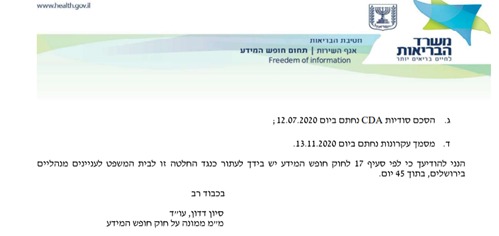
Principles Document - as can be seen from the same response to the FOI request presented above (section 10d), this document was signed between Israel and Pfizer on November 13, 2020. Apparently, this agreement is mentioned in the redacted "Information Sharing Agreement" presented to the public, but its existence was not previously known because it was specified in a redacted sentence in section 10.6. The new document reveals this previously redacted information."
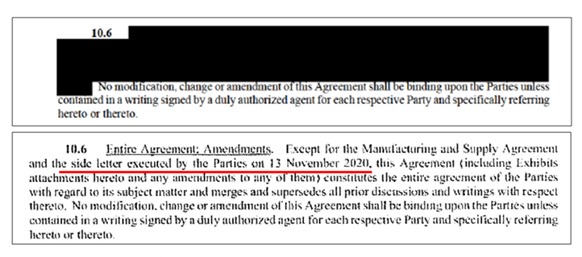
"In addition to the four main agreements/documents mentioned above, the response to the Freedom of Information request raises further questions about the agreements between Israel and Pfizer related to their transaction. As stated in the visible text of "The Information Sharing Agreement", there is a mention of a discount arrangement between Israel and Pfizer in section 7.7.2 of the cooperation agreement, but the details of this arrangement are not visible to the public. This raises concerns about the transparency of the agreements between Israel and Pfizer and what other information may be hidden".

"The lack of any reference to the discount arrangement in the MOH's response leaves the nature and purpose of the arrangement unclear. It is not known what the arrangement entails or why it was not mentioned in the response. What exactly is this arrangement and why is there no reference to it? Is it part of the mechanism that binds the State of Israel to the deal and project with Pfizer?
The Israeli Ministry of Health approved the vaccine before the FDA
"The series of agreements signed with Pfizer thus includes at least four agreements/documents: a Confidentiality Agreement signed on July 12, 2020; a Principles document signed on November 13, 2020; a Production and Distribution Agreement signed on December 1, 2020; and an Information Sharing agreement also signed on December 1, 2020. As shown in the timeline diagram attached below, all four agreements were signed before the vaccine received the EUA, and the Principles document was even signed before Pfizer submitted the request for approval. Additionally, the confidentiality agreement was signed before the company began its Phase 3 study, says Attorney Gur. "Under such circumstances, it is very difficult to take seriously the claim that this is not a real human experiment".
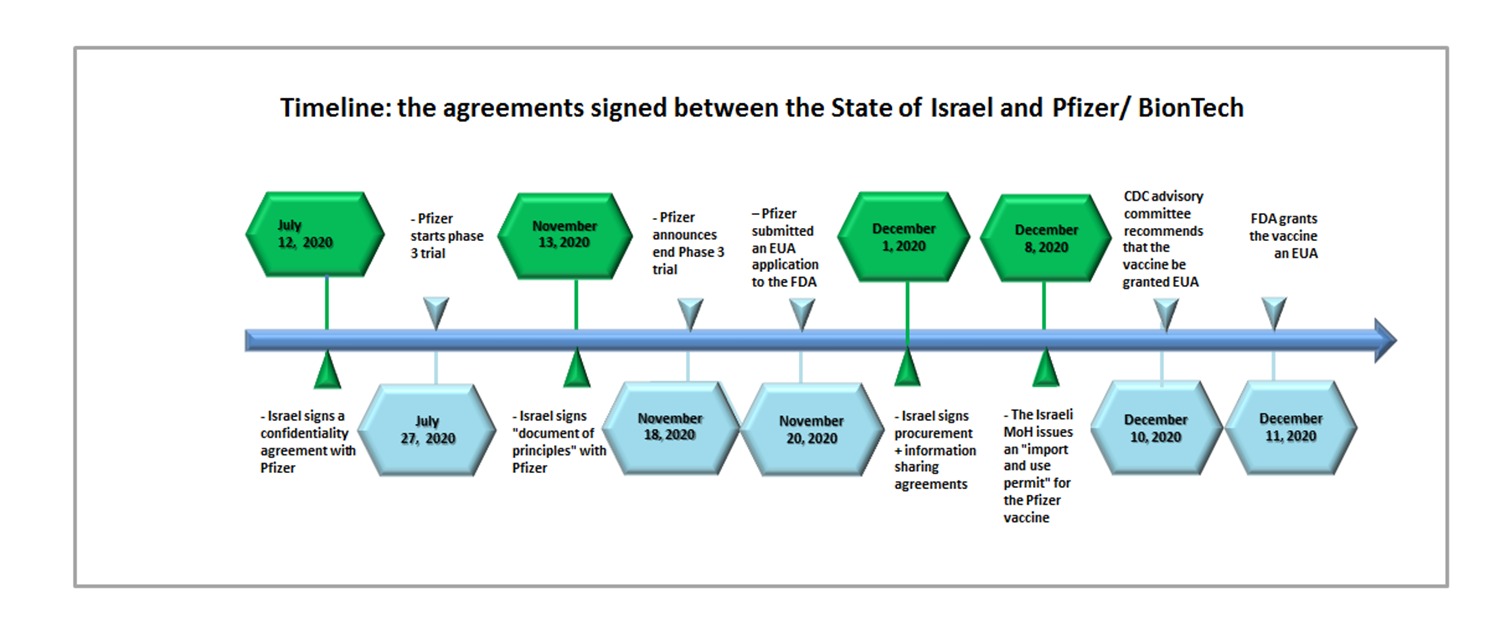
"The nature of the agreements, the timing of their signing, and the prolonged and inexplicable secrecy surrounding them raise the question of what occurred in this situation. Was there only financial negligence, or were there also instances of corruption and serious ethical violations involving the medical treatment of Israeli citizens? Was there prior knowledge of the FDA approval before it was actually granted, or was there a disregard for their importance? Alternatively, did the state have good reason to expect that the FDA approval was simply a formality? All of these possibilities are very serious and deeply concerning".
"What further raises concerns that this was an experiment on Israeli citizens and that the Ministry of Health was determined to carry it out for Pfizer is the fact that, on December 8, 2020 - three days before the FDA granted Pfizer an emergency permit – the MOH hastily issued an 'import and use approval' document for the product. While it could be argued that the likelihood of receiving the EUA was high on December 1, 2020, when the MOH signed the procurement and cooperation agreements with Pfizer, it is unclear why the MOH saw fit to issue the approval on December 8 rather than waiting for the FDA's decision. This suggests that the MOH relied solely on its own regulation in the deal with Pfizer and in the approval of the use of its experimental and innovative product for the entire population of Israel, with no transparency regarding the decision-making process. Unfortunately, it is not clear what the approval was based on".
The concealment and deception raise serious concerns
"As previously mentioned, the particularly serious issue that arises from the disclosure of information following the petition is the clear attempt by the MOH, as indicated by the new documents, to consistently and actively hide critical information about the deal with Pfizer, including the subjects of the agreements and the dates they were signed. Moreover, it appears that the MOH has attempted to mislead about the actual dates of the signings. Attorney Gur poses the following questions: 'Why is the MOH attempting to conceal the real signing dates and potentially misleading about them? If everything is innocent and normal, why are they hiding? Why has an official, signed copy of the "information sharing" agreement not been published, even a redacted copy with a signature indicating its validity, as is required in proper public administration? How can one explain MOH's strange behavior even in front of the court? How and why did they initially tell the court that they searched for the signed copy everywhere and did not have one? Is it credible that a state does not hold an official and binding copy of such significant agreements with a commercial corporation?' These actions raise serious questions about the transparency and integrity of the deal between the MOH and Pfizer".
Dr. Guy Shinar, a physicist with over 20 years of experience in medical device research and development, clinical trials, and regulatory affairs, and an inventor, co-founder and chief technology officer in several start-up companies, also finds it difficult to understand how the Ministry of Health could not locate the agreement for the largest medical procurement deal ever signed in the history of the State of Israel. He states: 'It is truly ridiculous that it takes so long for the Ministry of Health to present the agreement, and after all this time they still present it unsigned. When it comes to a deal of this magnitude, potentially worth hundreds of millions of dollars, it is puzzling, to say the least. As someone who works in the field, I can say that the standard practice is to keep agreements with the lawyer who drafted them. Simply call the partner responsible for its drafting and ask them to send it. It is hard to believe that an agreement of this magnitude would not involve an external lawyer in addition to the legal department of the MOH. The state hires an external lawyer for much less significant agreements, so why did the MOH not do so in this case? It seems unlikely. The obvious conclusion is that they do not want the public to know what is contained within the agreement. They do not want the public to know how decisions were made and why".
"The heavy concealment surrounding the deal with Pfizer raises additional questions and concerns. Attorney Gur states: 'One concern is that the State of Israel is serving both as a sales agent and as a showcase for Pfizer – in order to obtain the approval for this product and to introduce it to the rest of the world.' This concern is present in the wording of the "information sharing agreement" and is further exacerbated by the statements made by the Director General of the Ministry of Health, Moshe Bar Siman-Tov, to the members of the Helsinki High Commission before most of them resigned in protest of his decision to revoke the commission's powers. The concern is that the deal and Israel's obligations are not following the usual bureaucratic and ethical track".
"Dr. Shinar also believes that the MOH's attempts at concealment increase the importance of the unanswered questions regarding the research collaboration between the MOH and Pfizer. He states: 'I think the smell emanating from this research collaboration is very bad. None of the agreed-upon outcome measures were related to safety, such as overall mortality, hospitalizations for any reason, or side effects. It seems that the preconceived notion was that the vaccine is safe to use, and now all that remains to be investigated are various measures meant to prove its efficacy".
In an article published in October of this year by Brownstone Institute, Dr. Shinar explains that abandoning this preconceived notion became almost impossible once the agreement was signed, "due to a confluence, not only between Netanyahu’s political agenda and Pfizer’s commercial interests but also potentially between them and the academic prestige of senior Ministry of Health officials".
"The then (and again today) Prime Minister Benjamin Netanyahu faced the threat of the disbanding of his government and the replacement of his leadership in the elections. All this was overshadowed by indictments pending against him. Netanyahu decided to bet on Pfizer’s vaccine as the strategy that could potentially allow him to solve the COVID problem, with the added benefit of substantial political gain... Why did Ministry of Health officials enter into this agreement? Why didn’t they maintain their role as regulators, and why did they volunteer to serve as Pfizer’s marketing, distribution, research and publication branch? It appears highly likely that pressure from Netanyahu and his bureau contributed to the matter. But the personal angle, and the potential conflict of interest it may entail, cannot be ignored: the academic prestige conferred by numerous articles published in NEJM and the Lancet can be life-changing in terms of academic prestige and promotion".
Will we ever fully understand the events that transpired? The newly released documents only seem to create more confusion and raise additional questions. It appears that there is much more to the story that has yet to be revealed, and those involved - including the Netanyahu government and the Ministry of Health - are actively trying to conceal the truth and deceive the public. This is a grave concern, not just for the citizens of Israel, but for the entire world.
The Ministry of Health did not respond to the request for comment sent by Real Time magazine. A Pfizer spokesperson said that the company chooses not to comment on the article.
Make a change today!
"Real Time" Magazine is an online, self-funded news magazine, founded with a firm idealogy to make a different, alternative, uncensored quality news, accessible and direct to and with the public.
Our team members currently work as volunteers and we would DEEPLY appreciate and love your support, so we can keep provide what is direly missing in mainstream media.
click for single / monthly support
Thank you ??

תגובות לכתבה זו יועברו לאישור לפני פרסום. אנא השתמשו בשפה מכבדת ואם מצאתם טעות, אנא צרפו נימוק ענייני וקישור למקור הטענה.

Report
Make a change today!
"Real Time" Magazine is an online, self-funded news magazine, founded with a firm idealogy to make a different, alternative, uncensored quality news, accessible and direct to and with the public.
Our team members currently work as volunteers and we would DEEPLY appreciate and love your support, so we can keep provide what is direly missing in mainstream media.
click for single / monthly support
Thank you ??

You might also like...
Hamas October 7 massacre Did Not Happen in A Vaccum: UNRWA has built the infrastructure and fueled the hatred
The exposé according to which UNRWA employees participated in the October 7 massacre shocked the world. But did they all really not know? The evidence showing that UNRWA is systematically and consistently engaged in fueling hatred and was involved up to its neck in terror activities has been presented to world governments and the UN since at least 2003
"I don't 'feel' unsafe at MIT. I AM unsafe. As an Israeli and a Jew, I walk on campus with a target on my back"
MIT, Harvard and Penn presidents are scheduled to testify today before Congress on the increasing antisemitism on campuses. Meanwhile, even after more than 1700 Jewish and Israeli MIT students issued a letter to the administration warning about the tsunami of hatred - the university still refuses to act
Data from Israel's largest HMO reveal: an increase in the number of cancer diagnoses starting in 2021
The data from 'Clalit', obtained through a Freedom of Information request, also indicate an increase in the incidence of breast cancer starting in 2021, coinciding with the start of the COVID-19 vaccination campaign in Israel. The number of diagnoses is 4.5 to 5 times greater than the number among the unvaccinated
Data from Israel's HMOs reveal: a decline in the number of pregnant women in their first trimester starting in February 2021, immediately after the start of the Covid-19 vaccination rollout
New data from Israel's HMOs reveal: a decline in the number of pregnant women in their first trimester starting in February 2021, immediately after the start of the Covid-19 vaccination rollout
648 cases of side effects were reported to the VAERS system on breastfed infants whose mothers received the Covid-19 vaccine
Real-Time Magazine analysis reveals a concerning issue almost no one talks about: serious side effects and deaths of breastfed infants whose mothers received the COVID-19 vaccine
Breaking: Leaked Video Reveals Serious Side-Effects Related to the Pfizer COVID-19 Vaccine Covered Up by the Israeli MOH
The Israeli MOH had no adverse events reporting system for the entire year of 2021. They commissioned a research team to analyze the reports from a new system implemented on December 2021. A leaked video reveals that in June, the researchers presented serious findings to the MOH, that indicated long-term effects, including some not listed by Pfizer, and a causal relationship – so the Ministry published a manipulative report, and told the public that no new signal was found
"You violated the community rules": what is behind the increasing censorship policy of Facebook and Google?
A lawsuit recently filed in the US accuses Biden officials of conspiring with Facebook, Twitter and YouTube to censor free speech. The lawsuit comes on the footsteps of an investigation launched by the BMJ into the "Fact Checkers" network operated by Facebook. What stands behind these companies censorship policy? Accumulating information points to enormous economic and political interests
Breaking: The Israeli MOH is hiding a study it conducted, showing a 2-4 times higher rate of adverse events reports following Pfizer COVID vaccine in kids aged 5-11 vs ages 12-17
The study, commissioned by the MOH, also indicates new adverse events not reported in Pfizer's leaflet, and that some adverse events last more than a year. Despite being aware of these findings, the MOH is hiding them from the public and has recently authorized the booster dose for ages 5-11 and is preparing to approve the vaccine for infants
Breaking: 58 babies who received mRNA COVID-19 vaccines suffered life-threatening adverse events
An analysis of VAERS reports shows that contrary to the FDA's briefing document claiming that the majority of adverse events in Pfizers' clinical trial were non-serious – at least 58 cases of life-threatening side effects in infants under 3 years old who received mRNA vaccines were reported. For some, it is unclear if they survived. It is also unclear why the infants were vaccinated, and whether they were part of the clinical trials. However, in the upcoming FDA meeting on Wednesday, the FDA will not be able to argue it did not know
New Data From Ichilov Hospital: A drop in the number of live births starting 9 months after the beginning of vaccine rollout.
Faced with numerous reports of menstrual cycle disruptions following mRNA vaccination, health authorities have claimed that even if there is a rise in complaints, it’s only temporary discomfort. However, new data released by Ichilov show a drop in the number of live births, beginning exactly 9 months after the vaccine rollout began.












